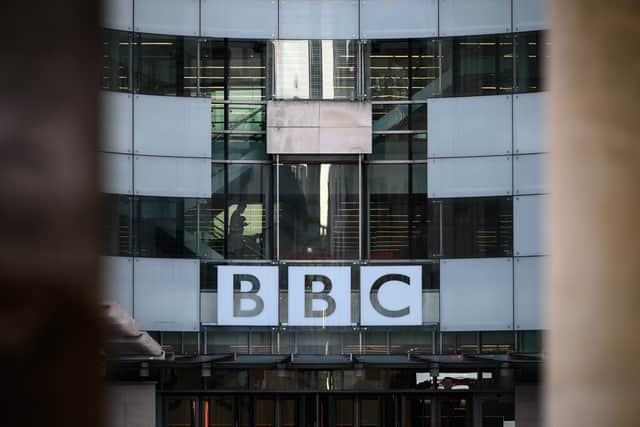TV licence fee UK: how much does it cost for BBC services in UK - is the price going up?
and live on Freeview channel 276
Members of the public could face a rise in how much they pay for their TV licence fee next year.
The Culture Department’s official policy will see the cost rise in line with inflation in April 2024 after a two-year freeze. According to a report in The Daily Telegraph, the Office for Budget Responsibility (OBR) has predicted the inflation figure used will be 8.2%. This would see people in the UK paying extra fees to watch TV at home.
Advertisement
Hide AdAdvertisement
Hide AdThe news comes after the BBC was caught up in a row over impartiality, after Match of the Day host Gary Lineker publicly criticised proposed new government legislation on immigration in a post on Twitter, comparing the language used to that of “1930s Germany”.
Following the incident some politicians including Jacob Rees-Mogg have called for the licence to be scrapped altogether. So, is the TV licence fee going up and how much is the planned rise? Here’s everything we know so far.
Is the TV licence fee going up?
The Culture Department’s official policy means that in 2024 the cost of the TV licence will rise in line with inflation after a two year freeze. OBR have predicted that this figure will be 8.2%, they also estimate that this would increase revenue made from the TV licence from £3.7 billion in 2023 to £4 billion in 2024.


According to the report from The Daily Telegraph, a BBC Spokesperson said: “The Government agreed a six-year licence fee settlement in January 2022 which froze the licence fee for two years, with increases in line with inflation from 2024. It is not for the BBC to speculate on what inflation might be and how that might impact the licence fee in future years. Ultimately it is for Government to set and confirm the cost of a licence each year. The BBC will continue to focus on what it does best: working to deliver world class content and value for all its audiences.”
Advertisement
Hide AdAdvertisement
Hide AdWhilst a Culture Department spokesperson explained: “We agreed a fair settlement with the BBC that will see the licence fee remain at £159 until 2024 to protect licence fee payers from current inflationary pressures, and then rise in line with inflation until the end of 2027. The exact level of inflation is yet to be confirmed. The BBC’s funding model faces major challenges due to changes in the way people consume media, which is why we are working with it to look at ways to ensure it is sustainable in the long-term.”
How much does it cost now?
A TV licence currently costs £159, with members of the public able to pay the fee in a variety of ways including monthly, quarterly and yearly. Those aged 75 years and older and who are on pension credit can access a free TV licence, whilst those who are blind or are in residential care can get a discounted licence.
Following the Gary Lineker impartiality row there has been a growing debate about the TV licence. Former business secretary Jacob Rees-Mogg recently called for it to be scrapped during an appearance on GB News, where he stated that the organisation’s funding model was the issue, not Lineker’s tweets.
Rees-Mogg said: “The issue is that the BBC is the state broadcaster, and that it’s funded by a tax on televisions. If it weren’t, then we wouldn’t need to worry about its impartiality and actually if we changed the funding mechanism of the BBC, we could have a much freer media, as they do in the United States, when people are allowed to say what they think.”
How much is the planned rise?
The planned rise will see the TV licence fee go up by a predicted 8.2% meaning members of the public will be paying an additional £13, meaning the fee could rise from £159 to £172 on 1 April 2024.
Comment Guidelines
National World encourages reader discussion on our stories. User feedback, insights and back-and-forth exchanges add a rich layer of context to reporting. Please review our Community Guidelines before commenting.
